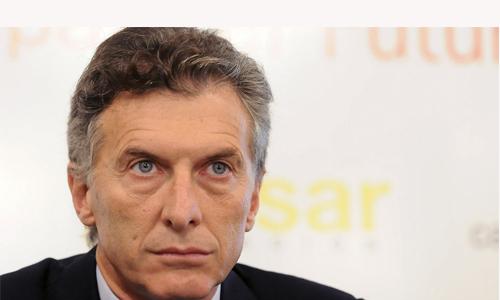Argentina elects pro-business Macri after 12 years of Kirchner rule
Argentina, in a stinging repudiation of outgoing leftist President Cristina Kirchner, elected a pro-market government president to take the helm of Latin America's third-biggest economy.
Conservative president-elect Mauricio Macri, fresh from Sunday's run-off election win, promised a "marvelous" new era was starting for his country, beleaguered by years of economic instability.
A former football executive and favorite candidate of big businesses and foreign investors, Macri is expected to be Argentina's most economically liberal leader since the 1990s.
This is a historic day, a change of era which is going to be marvelous, a beaming Macri told cheering supporters after his leftist rival Daniel Scioli conceded defeat.
We cannot waste time on revenge or score-settling, he said late Sunday. Shortly afterwards he swung his hips, dancing Argentine "cumbia" to deafening music.
Macri and Scioli fought a tense battle for votes in a country largely weary after 12 years under leftist leader Cristina Kirchner and her predecessor and late husband Nestor Kirchner.
Breaking with 12 years of leftist rule, Macri has vowed to ease foreign trade and dollar restrictions.
Celebrating on Sunday, he said it was time "to build an Argentina with zero poverty, defeat drug-trafficking and strengthen democracy" in the country.
Official results gave Macri 51.8 percent of the votes and 48.2 percent for Scioli, with 95 percent of ballots counted.
Macri is expected to have warmer relations with countries such as Britain and the United States.
Kirchner has had sharp words for them at times, including with Britain in the territorial dispute over the Falkland Islands, known in Spanish as Las Malvinas.
We want to have good relations with all countries, Macri said on Sunday.
He has vowed to negotiate with foreign creditors who have sued Argentina in the US courts for unpaid debts. Kirchner branded hedge funds "vultures."
But voters who backed Scioli fear Macri's reforms will roll back the social and trade policies of the combative outgoing president that have benefited the poor and small businesses.
Macri has proposed to immediately lift restrictions on imports and on US dollars.
Scioli has warned that would trigger a brutal devaluation of the peso, weakening ordinary Argentines' incomes.
End of Kirchner era
Analysts say Macri may struggle to push his reforms through a hostile Congress.
Now he has to transform his electoral coalition into a governing coalition, said Mariano Aguas, a political scientist at the universities of Palermo and La Matanza.
But Macri's victory marks a sharp political shift in the vast South American nation of 42 million people.
It breaks the grip of Peronism, the broad populist movement that has dominated Argentine politics for much of the past 70 years.
We have lived too long with Peronism, said Luis Nizzo, an 81-year-old retired engineer, after voting for Macri at a school in Buenos Aires.
But Guillermo Juarez, 25, said he voted for Scioli because of everything they say about Macri -- that he will take away support for working people and cut social welfare programs.
Scioli admitted defeat to Macri a few hours after polls closed.
I am a democrat and I respect the popular will, which has chosen an alternative, he said.
He said he hoped that God enlightens (Macri) to improve on the progress the country has made under the Kirchners.
After a 2001 financial crisis in which Argentina was bailed out by the International Monetary Fund, the Kirchners presided over a spectacular turnaround. But the economy now seems to be flagging again.
Growth was relatively slow at 2.2 percent in the first half of this year and inflation exceeds 20 percent.
Macri, former chairman of popular football club Boca Juniors, will take office as national president on December 10.
Related Posts

